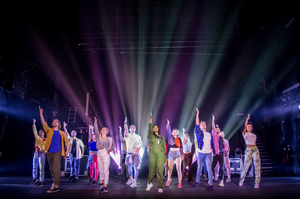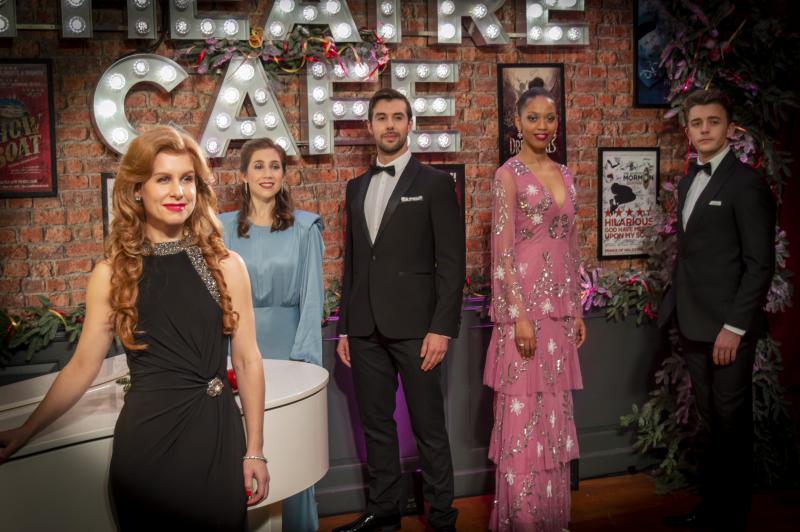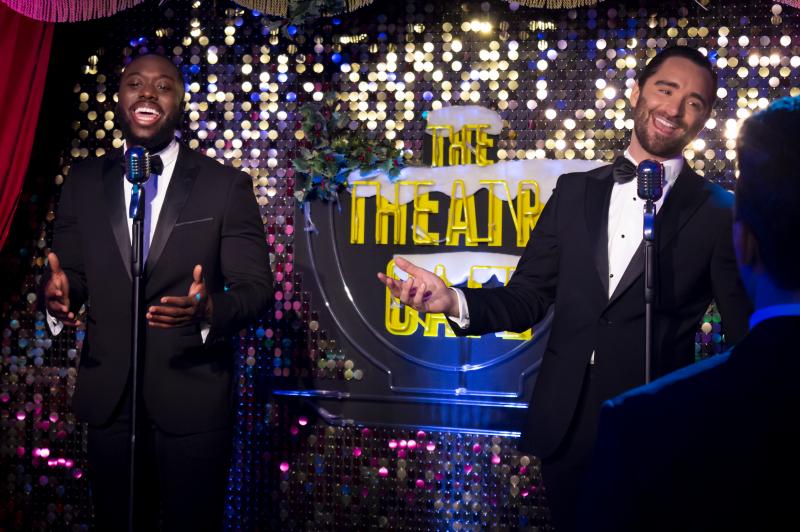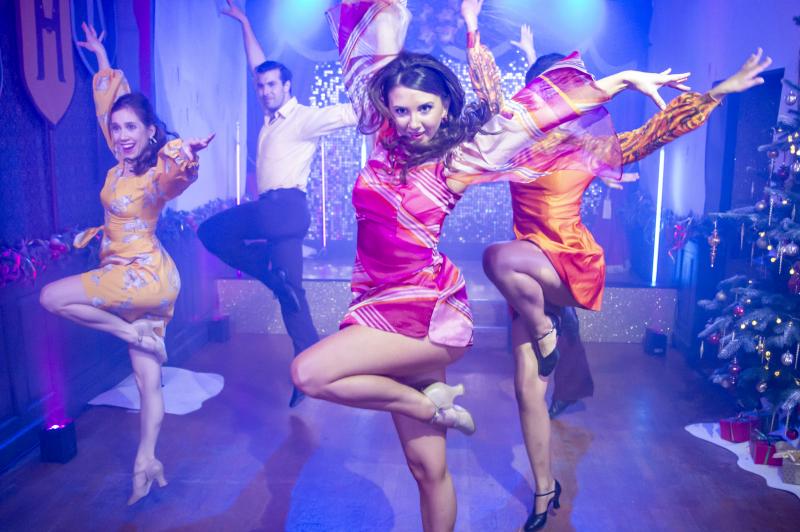Interview: Adam Blanshay Chats THE THEATRE CHANNEL
The Tony-nominated producer shares plans for the web series on both sides of the Atlantic

The Theatre Channel: Episode 4
Adam Blanshay is a Tony Award-nominated producer, behind London productions such as Notre Dame de Paris, Waitress and Come From Away. We spoke to Blanshay about The Theatre Channel and where it's going next!
How did you find 2020?
I think it's been unbelievably trying, both professionally and personally. From a mental health standpoint, my personal psychology and mantra are that you should really try to turn it around and make a positive out of it when faced with adversity. This is very much what I've tried to do in my respect, to no discredit to anyone else.
My company is relatively new, so we decided not to furlough any staff. We kept everyone on board and came up with the idea for the NHS charity gala we're doing in May. Then The Theatre Channel came about. By keeping working and having the commitment to be positive, things have come out of it.
I've really taken the time to focus on myself as well. I've been accepted to Oxford Business School starting later this year. Ultimately, I've been trying to make something positive out of something negative to keep going and trying to keep everyone going around me as well.
How did The Theatre Channel come about?
The Theatre Channel is a collaboration with The Theatre Café. I've known Ryan, Nicky and Joe from The Theatre Café for years. They've been extraordinarily supportive of my work, going back to Notre Dame de Paris at the London Coliseum, Lucie Jones: Live at the Adelphi, and so on in pre-COVID times.
As soon as lockdown 1.0 was announced, they went straight into the Leave A Light On concert series which was extraordinarily impressive. When that concluded, I bumped into Ryan, who was the CEO of The Theatre Café and London Theatre Bookings at the time.
I bumped into him in June in Covent Garden Piazza, and he mentioned that the coffee shop wasn't opening under normal capacity and circumstances for the foreseeable future. Instead, they were looking to use the space to film things.
Basically, sort of on the spot, I said, "Well, why don't we use it to film songs and scenes from musicals that normally take place in bars and coffee shops and make a web series from that?" That conversation bore the idea of The Theatre Channel right there. It has since evolved beyond songs from coffee shops and bars, but songs that make sense in the context of being created at The Theatre Café.
I utterly applaud The Theatre Café for the work they do. Under normal circumstances, they are the cogs and wheels of the West End. It has to be celebrated that they haven't shut down their operations or closed their doors to the industry at any point.
They're not selling coffee and selling tickets at the moment, but at any given time there are up to twenty people coming to work in the building in a socially distanced manner. The way they have stuck by the industry, basically turning the entire coffee shop into a film studio, is just incredible.

in The Theatre Channel: Episode 4
You have released four episodes so far, any highlights?
Working with Linzi Hateley and giving her the chance to graduate from Carrie White to Margaret White was extraordinary. It was amazing to have her come back and step into the shoes of the mother all those years later, after all the difficulties with Carrie on Broadway, we knew it was particularly cathartic for her. To be in the room with her as she did, that was really spectacular.
It was also great to work with Alex Gaumond and include "Le Monde est Stone" from Starmania. While I'm English, I grew up with many French musicals like this quintessential rock musical. So when we put together the line-up for the rock musicals episode, I asked my team if we could include - what I think is - the most iconic musical theatre song in French of all time.
The rights were complicated to get. They're usually very closed with those rights, and they were tricky to get, but we ended up getting them. Being able to reintroduce this show to an English audience was incredible.
Each episode has its own theme, what's next for the channel?
The fifth episode is themed around the "Golden Age" of Broadway from the '50s and '60s. There are tremendous songs in there from that period.
I'm really looking forward to exploring the British invasion, which is what I grew up with. I'd also like to do an episode dedicated to new writing to give new writers a platform. Additionally, I want to explore contemporary America musicals, like Next to Normal and If/Then. We've got a really great line up coming up.
We don't plan too far in advance because we like things to happen organically. What I mean by that is we might hear a song that inspires us, or an artist comes forward with an idea to work with us. We sort of all episodes to fall into place a few months before being filmed, so we don't have the entire thing planned out.
We have the fifth episode planned, doing some casting for the sixth and have an idea for where to take it, but it's all a collaborative process between Michael England, Bill Deamer and myself. In every episode, Bill has a song he's excited about and I have a song I'm eager to bring to the table. Michael then does a superb job sourcing and creating the tracks. It's very collaborative in that respect.
For me, it's like a musical theatre joy ride. I get to "play jukebox" in every episode and pull out my favourite songs from different shows. I love rock musicals, personally, so every single song in the rock episode were songs from shows I adore. It was so much fun to curate that with the creative team.
How have you found the process of adapting to producing shows for an online audience?
I have really enjoyed this process. To no discredit to the live sector, I am a live event producer and will very much return to the live event side of things when the pandemic is over. People have approached me before about film and television, but my answer has always been no.
I love the processes involved in online content because you have an additional level of control. You don't normally get that in a live scenario. You get to control the image the audience gets to see for more than in a theatre.
We have the flexibility to go into the editing room and come out with a product that we are 200% happy with. What's exciting about the live element is that idea that every show is individual, but at the same time, there are so many elements that can go wrong: someone could be sick; scenery can malfunction; an audience member can cough on the punchline of a joke and ruin the moment.
I tend to be extremely nervous and anxious on the first night of a live show, but whenever we've released an episode, we've always been entirely satisfied with the content we're putting out. I've enjoyed having that extra layer of control.
I've also enjoyed that we've been able to be so imaginative with our design team. We've come up with some extraordinary worlds as we did with Ria Jones and "The Last Midnight". We were able to transform The Theatre Café, and I loved using our imaginations in that aspect.
I've really enjoyed watching Ben Hewis, our videographer, with his camera etc. - watching him get right up in there into the faces of the artists and then go to the other of the room, on a ladder or something, to get these incredible shots...it's really been really such a beautiful learning curve to be on at the same time together.
What's been the biggest challenge?
One of the most difficult aspects has been licensing. Normally, when you do a musical, you're licensing a collective songbook that comes under one license. In this case, we're licensing individual songs. Every song has a different author - sometimes two of three different rights holders - so we have to go to multiple licensing requests to get clearances for songs. That can take time, so there's definitely been a big learning curve there. We're getting the hang of it though.
It's a delicate balance. The Theatre Channel series is not a concert, nor is it not a full performance. It's somewhere in between in terms of grant of rights and PRS rights. That said, whenever we do a Stephen Sondheim song, we write to his office and get approval for the song. It's incredible to have this project on his radar and have him give the thumbs up or down. It's great.

The Theatre Channel: Episode 4
And now you're launching The Theatre Channel in the US. What can you tell us about that?
We've just launched with Playbill as our American partner. They are going to be at the forefront of distributing the content across America. Playbill has a big interface and a big platform.
They will feature and publish the episodes and create bespoke content - things like "Behind the Scenes" videos with the artists exclusive to the playbill platform. They've also come on board as producers so it now the title of videos will say "Adam Blanshay Productions, The Theatre Café and Playbill present..."
Growing up in North America, I've saved every Playbill since my first trip to see Phantom on Broadway when I was eight. You could say this is a dream come true or an ultimate stamp of credibility to now be working with Playbill.
Playbill is the first website I check in the morning, it's the last website I check at night, and I check it probably twice every hour during the day - more than CNN! - so it's really exciting to have their support.
I'm also excited to help familiarise American audiences with the best of British talent. Every single episode features a wide array of starring, featured and emerging artists. This is a really amazing opportunity to show off the talent we have in the UK to the US and Canada. As a creative team, we're working really hard to create assets where we can feature the artists to get audiences excited about the talents we've curated for these episodes.
Sadly, with all the restrictions, we can't have artists from the states or elsewhere. I'd love to bring in friends from France and so on, so forth, but at the same time, we're not short of talent in the UK by any means. I'm really excited about the people coming up in the next year of episodes and beyond.
What thrills me is that at the end of shooting the ten or so episodes we have planned, we will have a fully curated series of musical theatre. It'll be a huge range of diverse songs from US/UK/new writing, as a digital encyclopaedia of musical theatre.
Hopefully, we can share and distribute internationally to Asia, Australia, South America and elsewhere. The series will be a complete musical theatre journey over the past 100 years featuring the best of British talent.
This project wouldn't have had legs or viability if it weren't for the pandemic. It's a weird situation where this year has brought out such terrible lows, yet The Theatre Channel has been a real joy and positive out of a horrible situation.
Anything else you can tell us about any your productions returning to our stages like Moulin Rouge?
Moulin Rouge is going ahead. Various new dates are about to go out, and tickets will be going on sale. I'm also looking into transferring a socially distanced show that did well outdoors, so I'm looking to bring it indoors at the start of the early spring season. Although everything is still up in the air, I'm ever the optimist.
How have you coped with the sudden changes in restrictions?
One of The Theatre Channel's upsides is that in lockdowns and various tiers, we have still been able to continue filming. The biggest blessing was during lockdown 2.0 was when television was given the ok to proceed.
There have been some extraordinarily tense moments. We released episode two, and the next day we woke up to in murmurs of a second lockdown. So, we made this whole contingency plan for not being able to film for the next four weeks then suddenly we get wind of TV/film being able to film, so it changes again. It was a very memorable 48 hours!
At the same time, I'm acutely aware that there are a huge amount of people who are not working at the moment. I lived in New York for 14 years. I love eating out. I have so many friends in hospitality who lost their jobs.
I really don't want to be self-congratulatory when working and creating this thing where so many people have nothing. That's not what this project is about. I'm just doing my part to keep busy and employ as many people as possible, keeping people creating and keeping people working.
I recognise how difficult things are for people just now. It has been difficult for us too, but one of the beautiful things about these circumstances is that you learn, and you teach yourself a whole new unprecedented level of gratitude for self, colleagues, for others.
I've found that I've really been able to connect with the little moments of getting together with a friend for a drink or just going to someone's house for a nice dinner - when we were allowed, that is! The human interaction with people has been a highlight of this year. I've tried to adjust my thinking, my work, and even my business plan to just get through it!

in The Theatre Channel: Episode 4
Any advice for aspiring producers?
Hang in there. The Society of London Theatre (SOLT) are a great resource. They are very much on top of things. Be creative as much as you can. You will spend a lot of time applying for grants but, at the same time, you should carve out certain hours in the day to think of ways you can adapt your business plan to the circumstances.
We live in the digital age, and audiences have really responded to digital theatre. I really hope and believe that coming out of the pandemic, digital theatre will continue because it can bring content from London to the regions and overseas. I don't think it's going to go away.
Producing is a wonderful avenue to explore, but there are moments where it can be lonely, particularly at the moment. Hang in there. No one is alone. If anyone is feeling low, please reach out to me! We're such a good support system for each other as an industry.
To mention them again, SOLT is such a great resource for support. I definitely recommend people follow them and all the various websites they've provided. It's a platform that definitely won't go away so aspiring producers should explore that.
Things are looking up. We have the blessing of being in the UK where people like Nica Burns have just pushed and pushed for us. We have huge advocates like Sonia Friedman working with the government. We're miles ahead of the US, who have been told theatres are basically shut until September 2021.
Whereas here, Nica was ready to open theatres with a socially distanced season. I went to the first night of Everybody's Talking About Jamie. It was tremendous. We're fortunate in that aspect, and I thank our industry leaders, and for bringing us to the point, we're in right now. We're ahead of the game!
Why should people tune in to The Theatre Channel?
People should tune in because it's a half an hour of theatrical escapism. The Theatre Channel is a project crafted with such love and care for our viewers and our industry.
There's something in there for everyone. There are familiar songs and new discoveries. You have the opportunity to see your favourite stars in a new light. When we work with an artist, we very much encourage them to think of a song that's not from something they've done before, to go for a style new to them. Something outside of any pigeonhole of expectation. It's a great platform to look at a new side of their talent.
The episodes have a broad range of diversity and some really exciting content. Ultimately, it's been done with so much love and affection. We want to provide theatrical release for people who can't have it right now.
Access to The Theatre Channel Episodes 1-5 is now available for purchase online
Photo credit: Edward Johnson
Comments

Videos

